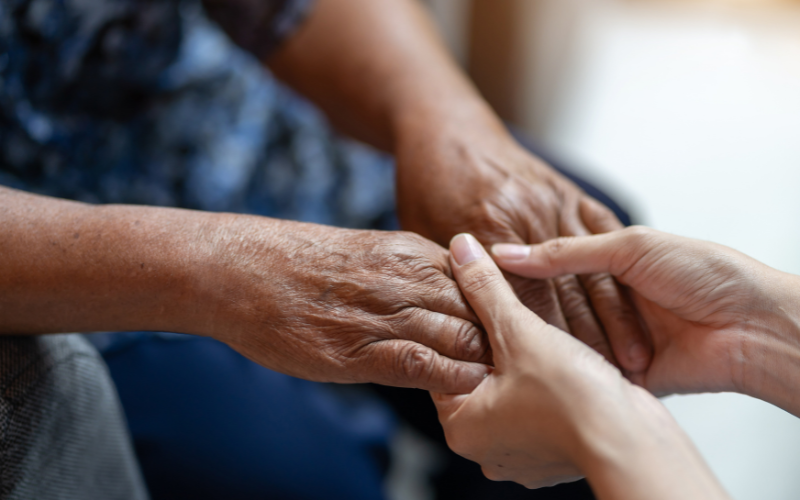
Family caregivers play an important role in providing care to a loved one—it is a job that carries with it an enormous responsibility to care for the physical, emotional, and mental well-being of another person. Caring for someone—whether that be through administering medication, helping with everyday activities such as grocery shopping or meal preparation, or managing more complex tasks like navigating healthcare systems—presents unique challenges and can quickly become overwhelming.
According to a recent report from the National Alliance for Caregiving, over 53 million Americans provide unpaid care to an adult age 50 or older. While caregiving can be a fulfilling and rewarding experience, it often comes with significant challenges that can impact the caregiver’s physical and emotional well-being. In this blog post, we’ll explore some of the most common challenges faced by family caregivers based on interviews with caregivers, studies, and expert opinions, as well as strategies for overcoming them.
Challenges Faced by Family Caregivers
1. Financial Strains
Many family caregivers face significant financial challenges as they are often required to reduce their working hours or quit their jobs entirely to care for their loved ones. This can lead to a loss of income, reduced retirement savings, and difficulty paying for basic needs like food and housing. Some successful strategies to mitigate these challenges include seeking out community-based programs that provide financial assistance and exploring social security benefits available for family caregivers.
2. Physical and Emotional Exhaustion
Caregiving can be physically and emotionally exhausting, leading to caregiver burnout. Many caregivers experience sleep disturbances, weight gain/loss, depression, and anxiety. To mitigate these challenges, it’s important for caregivers to prioritize self-care activities such as exercise, adequate sleep, and respite care. Respite care provides the caregiver with a break from their caregiving duties and can be provided by community-based programs, in-home respite care services, or through family members and friends.
3. Lack of Privacy
The role of a family caregiver is a demanding and selfless one. While providing care for a loved one in the comfort of their home can be deeply fulfilling, it can also bring feelings of frustration and a lack of privacy. Particularly in smaller living spaces, it’s often a challenge to create boundaries and seek solitude from the constant demands of caregiving. However, it is important for caregivers to recognize the importance of self-care and prioritizing their own physical and emotional needs. With clear communication, planning, and the help of support resources, caregivers can establish a healthy balance that benefits both themselves and their loved ones.
4. Balancing Work and Caregiving Responsibilities
Family caregivers often face the difficult task of juggling their caregiving duties with their work obligations. This can lead to significant stress and burnout for these caregivers as they try to manage both responsibilities simultaneously. Employers can play a valuable role in mitigating this challenge by providing support, such as offering flexible work arrangements that accommodate caregiving schedules, paid leave to handle unexpected situations, and access to caregiver support groups. By providing these resources, employers can help alleviate the stress that family caregivers face, improve their well-being, and ultimately increase their overall productivity in the workplace.

5. Lack of Support or Resources
Family caregivers often feel isolated and lack support, especially when providing in-home care in rural communities where resources may not be readily available. Programs such as Senior Corps, which provide companionship and emotional support to seniors, can help reduce social isolation. Additionally, online forums and support groups can be a valuable resource for caregivers who may not have access to local support groups.
6. Resource Constraints
For many family caregivers, caring for a loved one can be an overwhelming responsibility that is further compounded by the resource constraints they face. These constraints often include lack of access to transportation, technology, and healthcare services. Thankfully, community-based programs have emerged as a source of support for caregivers and provide much-needed assistance through transportation and assistive technology. In addition, telemedicine and telehealth services have revolutionized the way we care for seniors by providing remote care, especially for those living in rural areas. By leveraging these resources and solutions, family caregivers can better support their loved ones while maintaining their own well-being.
7. Guilt
Caregivers often experience a sense of guilt, feeling as though they could have done more or feeling responsible for any negative outcomes that may occur. This guilt can stem from the caregiver’s desire to provide the best possible care for their loved one or feeling as though they have put their own lives on hold to focus solely on caregiving. It’s important for family caregivers to understand that these feelings of guilt are normal and that they are not alone in experiencing them. Seeking support from healthcare professionals or caregiver support groups can help alleviate some of the burden and provide a sense of validation for the hard work and dedication that caregivers provide.
Family caregiving is a critical but challenging role that impacts millions of Americans. Caregivers often face significant financial, physical, and emotional challenges, including social isolation and resource constraints. It’s crucial for caregivers to prioritize self-care, seek out community-based programs and resources, and explore options such as respite care to mitigate these challenges. By recognizing the difficulties faced by caregivers and providing support and resources, we can better support and improve the quality of life for both caregivers and the loved ones they support.
For more information on our respite or home care services in Park Ridge and Schaumburg, IL, contact the dedicated team at Elderly Homecare at (847) 796-6685 or submit a form through our website.




